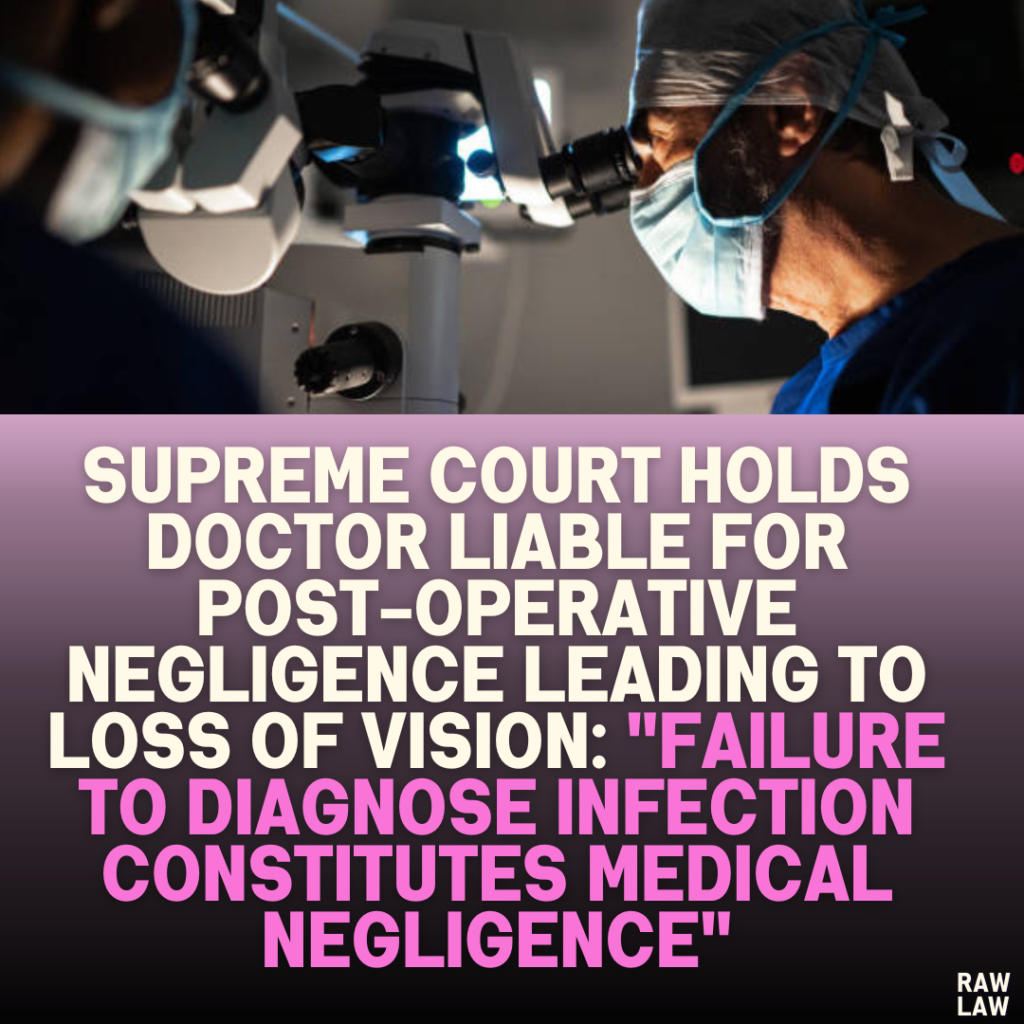Court’s Decision:
The Supreme Court allowed the appeal filed by the legal heirs of the deceased appellant, overturning the decision of the NCDRC. It restored the findings and order of the State Consumer Commission, which had held the respondent doctor liable for medical negligence. The court directed the respondent to pay ₹3,50,000 as compensation to the appellants within two months. If not paid within this timeframe, the amount would accrue interest at 12% per annum from the date of judgment until realization.
Facts:
- The appellant, a cataract patient, underwent surgery performed by the respondent doctor on January 19, 1999.
- Post-surgery, the appellant experienced severe pain, headache, and discharge from the operated eye, yet the respondent doctor reassured him that the operation was successful and prescribed basic treatments.
- The condition worsened, prompting the appellant to seek opinions from other specialists, including Dr. Chitra Khare and Dr. Nitin Prabhudesai, both of whom diagnosed a severe infection (endophthalmitis), likely caused by contamination during surgery.
- On January 29, 1999, the appellant underwent surgery at a military hospital to address the infection, resulting in the loss of vision in the right eye, with the eyeball retained only for cosmetic purposes.
- Aggrieved, the appellant filed a consumer complaint alleging medical negligence and seeking compensation.
Issues:
- Was the respondent doctor negligent in diagnosing and treating the post-operative infection?
- Did the appellant’s actions in altering post-operative care contribute to the infection?
- Is the compensation awarded by the State Commission appropriate under the circumstances?
Petitioner’s Arguments:
- The respondent failed to diagnose the infection despite the appellant’s repeated complaints and consistent symptoms, demonstrating gross negligence.
- The principle of res ipsa loquitur applied because the infection and its consequences were evident and did not require detailed expert evidence.
- The NCDRC erroneously relied on the respondent’s claims of patient mishandling, ignoring contradictions in the respondent’s medical records.
Respondent’s Arguments:
- The infection was not due to any fault during the operation but was caused by the appellant’s failure to follow post-operative care instructions, specifically by applying an unauthorized dressing on the operated eye.
- The respondent argued that such actions discharged him of liability.
Analysis of the Law:
- Duty of Care: The respondent had a duty to provide proper post-operative care, which was breached when he failed to identify the infection despite consistent complaints of pain, discharge, and vision loss.
- Negligence: The respondent’s inability to diagnose the infection and take corrective action, even when symptoms were evident, constituted negligence. The infection could have been treated had reasonable care been exercised.
- Burden of Proof: Although expert evidence was not required, the appellant presented corroborative opinions from specialists and medical records, which substantiated the claim of negligence.
Precedent Analysis:
Although the judgment does not reference specific past cases, it applies the well-established principle of res ipsa loquitur (the thing speaks for itself), indicating that the adverse outcome was so apparent that negligence could be inferred without detailed evidence.
Court’s Reasoning:
- The respondent failed to provide credible evidence supporting his claim that the infection resulted from the appellant’s post-surgery mishandling.
- Expert medical opinions submitted during the proceedings indicated that the presence of pus and infection after cataract surgery was highly unusual and a sign of poor medical care.
- The respondent’s medical records were inconsistent and lacked credibility, as crucial documents were only produced at the appellate stage, with no mention of trauma in the initial prescription records.
- The court emphasized that the infection’s timely diagnosis and treatment could have prevented the appellant’s loss of vision.
Conclusion:
The Supreme Court reinstated the order of the State Commission, directing the respondent to pay ₹3,50,000 in compensation within two months. Failure to comply would result in an interest of 12% per annum on the amount until realization.
Implications:
- For Medical Professionals: The judgment underscores the importance of prompt diagnosis and adequate post-operative care. Any lapses in maintaining proper medical records or addressing patient concerns can result in liability.
- For Patients: It reinforces consumer protection rights, holding medical practitioners accountable for negligence under consumer laws.
- Legal Principle: The case reaffirms the application of res ipsa loquitur in medical negligence cases, allowing courts to infer negligence based on the apparent facts without requiring detailed expert evidence.




Pingback: Bombay High Court Rejects Plea to Quash Criminal Proceedings in Financial Misconduct Case: Emphasizes Importance of Due Process and Unimpeded Investigation in Allegations of Fraud and Forgery - Raw Law
I read this article fully about the comparison of hottest and previous
technologies, it’s awesome article.